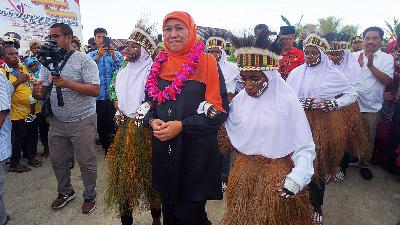North Tapanuli Regent Nikson Nababan Helps Liberate Villages
Monday, February 27, 2023
The community’s livelihood comes from products of the protected forest. #InfoTempo
arsip tempo : 174553206331.

When he first served as Regent of North Tapanuli in 2014, Nikson Nababan discovered that 70 out of 241 villages in the North Tapanuli Regency were isolated. It was because their road access was only in the form of footpaths, and they had not yet received electricity. He then aspired for villages to become the driving force for the country’s economy, the villages must be free from isolation and underdevelopment.
“We opened up access and liberated the villages,” said Nikson in the Teras Negeri program at the Tempo office, Wednesday, February 22, 2023.
The key to the economy is infrastructure, such as roads and bridges. That is why the government of North Tapanuli Regency in North Sumatra Province continues to improve accessibility and facilities for the villages.
Once access to the village became smoother, Nikson Nababan learned that the community’s livelihood came from products of the protected forest. With this condition, their source of livelihood would be threatened if one day the function of the forest is changed. If that happens, according to Nikson, the local people would no longer be able to make a living in the forest.
The North Tapanuli Regency government then studied the customary land management in various regions and conducted studies with academics. Nikson Nababan pleaded with the Ministry of Environment and Forestry to release the land with forest status in the North Tapanuli Regency in accordance with Forestry Minister Decree No. 579 to be made public property.
Long story short, the request was granted, and Nikson then issued a regional regulation and a regent decree containing the recognition and protection of indigenous peoples. Currently, there are three indigenous communities that own customary land and have been verified by the Customary Law Community Verification Team of the Ministry of Environment and Forestry.
“This means that the land that belongs to the community is no longer under the management of protected forest, so they can use it as a communal source of livelihood,” he said. “This is our effort to protect the community, manage the forests, protect the ecosystem, and ensure their survival.”











